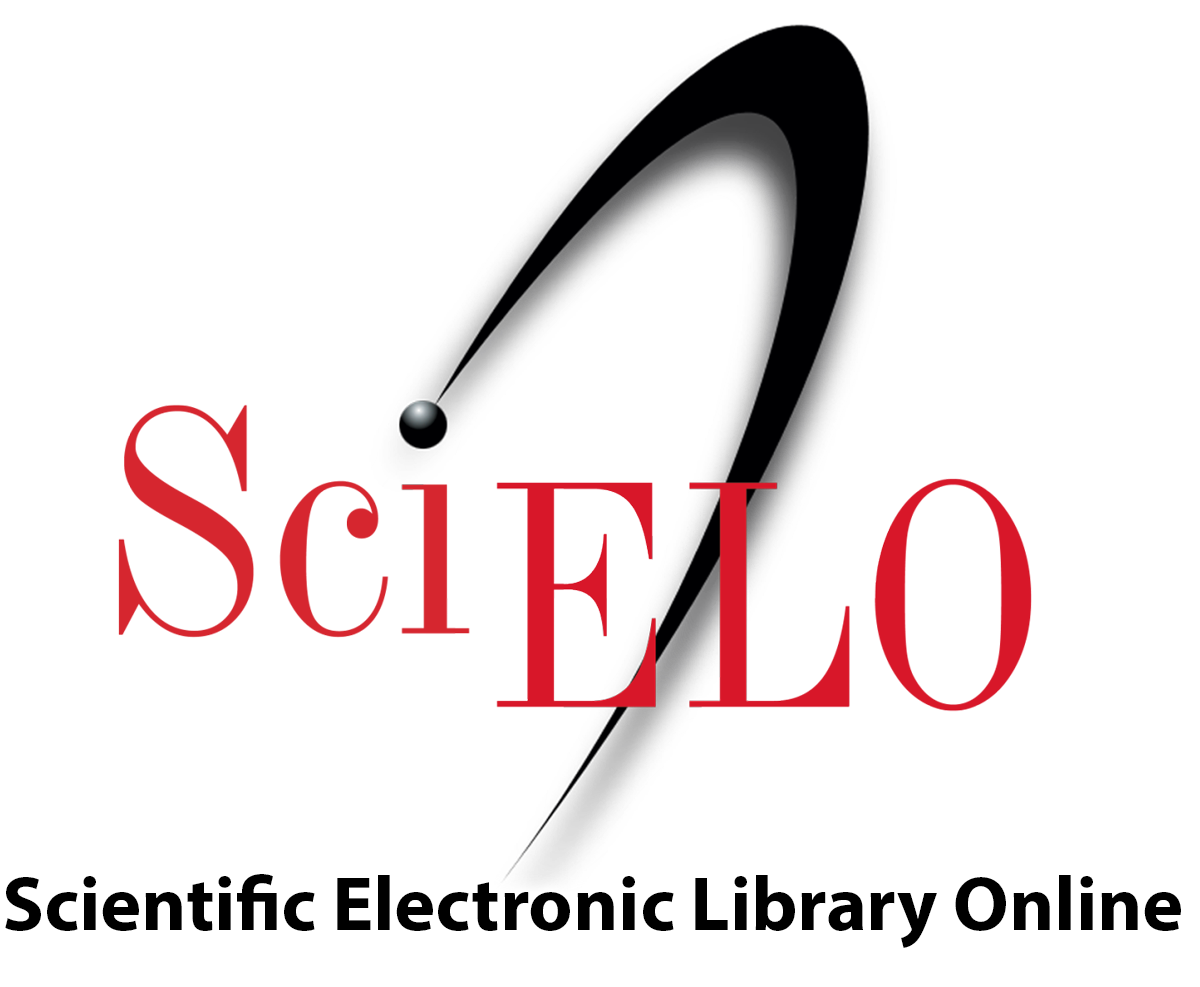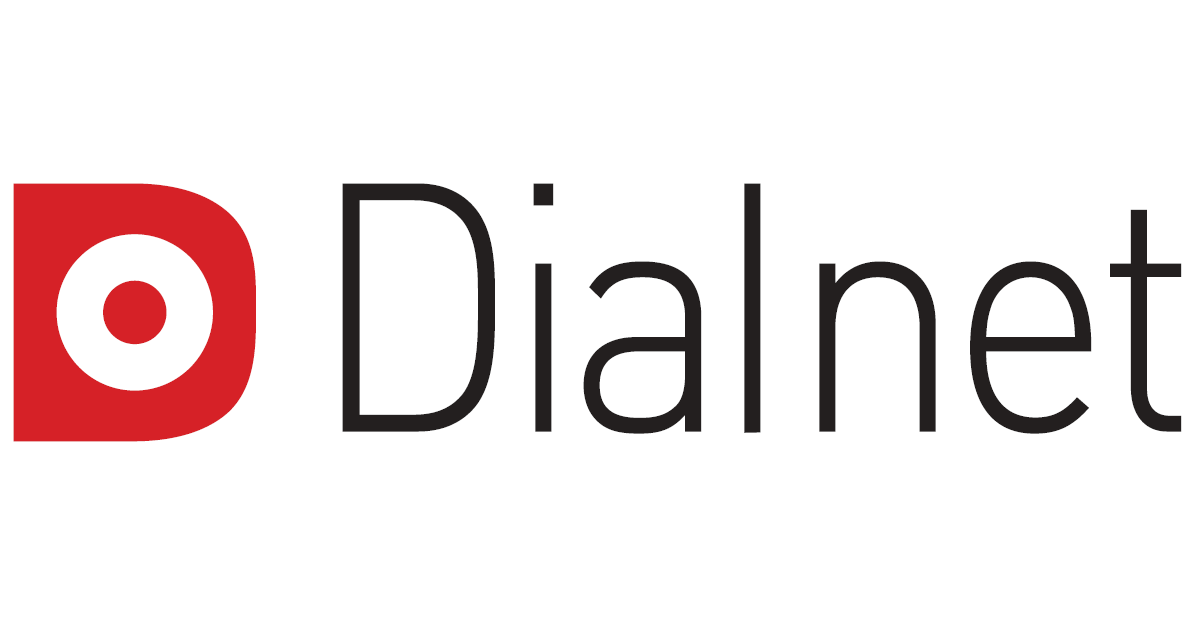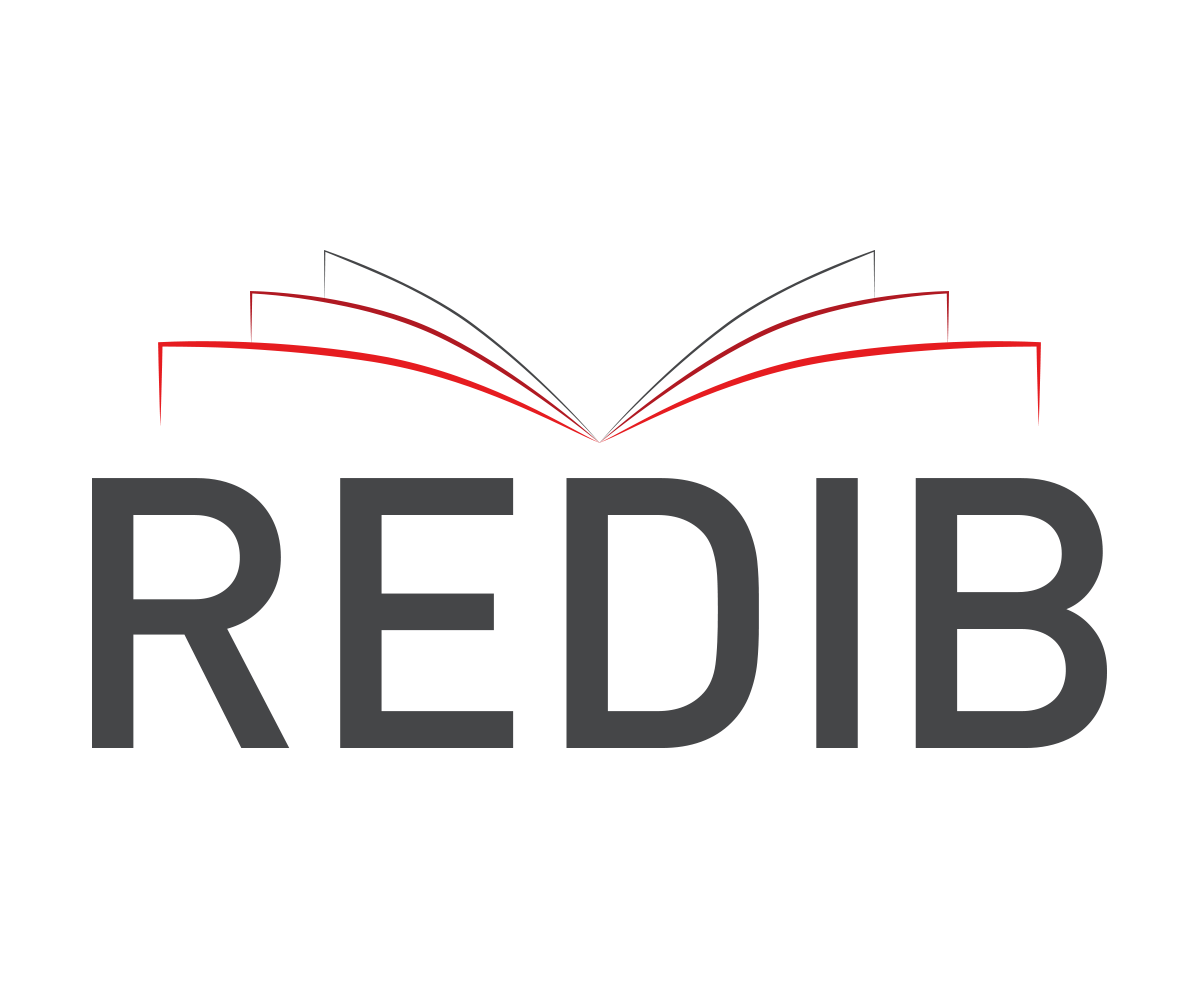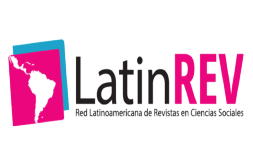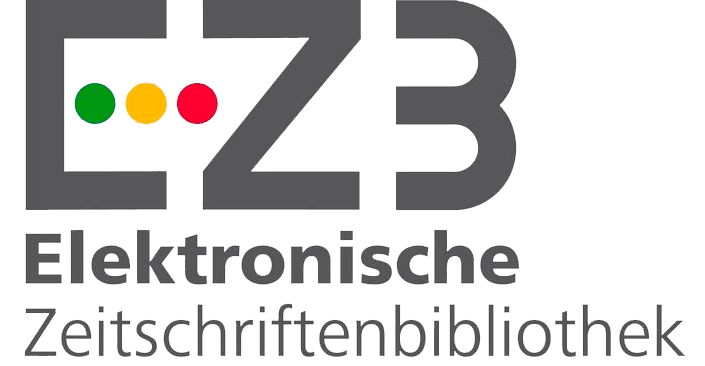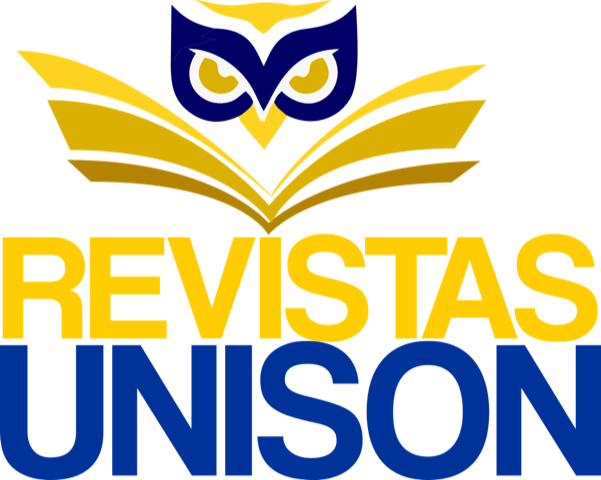The management of knowledge, past, present and future. A literature reviews
DOI:
https://doi.org/10.36791/tcg.v0i18.128Keywords:
Knowledge, management, models, organizationsAbstract
Since the beginning knowledge management has always been thE most interesting field for academics and professionals, and it is seen as a hope for improvement within the organization. One of the challenges of knowledge management is to manage it from the process of creation, exchange, combination, and application of knowledge to clarify and enhance the organizational process. This research aims to provide a theoretical view of the concept of knowledge management, its origins, models, applications, status quo, and the future to highlight its importance and impact on the organization. When reviewing scientific articles, literature analysis is used as a research method. As a result, the latest technical level of terminology knowledge management, its future model and an approximate synthesis were obtained.
Downloads
References
Abellón, O., y Rojo, T. (2004). Brainworkers:
Trabajadores del conocimiento. Aposta Revista de Ciencias Sociales, 5, 1–5.
Abeson, F., y Taku, M. A. (2009). Knowledge source and small business competitiveness. Competitiveness Review: An International Business Journal incorporating Journal of Global Competitiveness, 19(2), 88–95. https://doi.org/10.1108/105954209109422 52
Alavi, M., y Leidner, D. (2001). Review: Knowledge management and knowledge management systems: conceptual foundations and research issues. MIS Quarterly, 25(1), 107-136. https://doi.org/10.2307/3250961
Avendaño, V., y Flores, M. (2016). Modelos teóricos de gestión del conocimiento: descriptores, conceptualizaciones y enfoques. Entre ciencias: Diálogos en la Sociedad del Conocimiento, 4(10), 201–227 https://doi.org/10.21933/j.edsc.2016.10.181
Barney, J. (1991). Firm Resources and Sustained Competitive Advantage. Journal of Management, 17(1), 99–120.
Bellinza, M., Guerrero, N., Colon, S., y Ramírez, W. (2011). Gestión del conocimiento: Aproximaciones teóricas. CLIO América, 5(10), 257–271. https://doi.org/10.21676/23897848.422
Bueno, E. (1998), Modelo Intelect, Euroforum Escorial, San Lorenzo del Escorial.
Bueno, E. (1998). El capital intangible como clave estratégica en la competencia actual. Boletín de Estudios Económicos 53, 207 229.
Blanco, R., Fontodrona, J., y Poveda, C. (2017). La industria 4.0: El estado de la cuestión. Economía Industrial, 406, 151–164.
Borroto, M. J. (2007). La Gestión Del Conocimiento En La Nueva Economía. Algunos Apuntes. Ciencia En Su PC, 5, 30–40.
Buisán, M., y Valdés, F. (2017). La industria Conectada 4.0. Información Comercial Española, ICE: Revista de Economía, 898, 89–100. https://doi.org/10.32796/ice.2017.898.1963
Casado, J. M. (2020). Más allá de la gestión tradicional del conocimiento. 2.C Consulting. https://www.dosc.es/2020/01/30/mas-alla-de-lagestion-tradicional-del conocimiento/
Chatti, M. A. (2012). Knowledge management: A personal knowledge network perspective. Journal of Knowledge Management, 16(5), 829–844. https://doi.org/10.1108/13673271211262835
Davenport, T.H. (1994): The Coming Soon: The CKO, InformationWeek, September 5.
Davenport, T. H., y Prusak, L. (1998). Working Knowledge How Organization Manage What They Know. (Harvard Business School Press, Ed.) (1–199).
Boston, Massachusetts, United States of America.
Dabić, M., Lažnjak, J., Smallbone, D., y Švarc, J. (2019). Intellectual capital, organisational climate, innovation culture, and SME performance: Evidence from Croatia. Journal of Small Business and Enterprise Development, 26(4), 522–544. https://doi.org/10.1108/JSBED-04-2018-0117
Edmonson, R. R. (2010). Knowledge management practices within Hong Kong organizations. Journal of Knowledge-based Innovation in China, 2(2), 213–232. https://doi.org/10.1108/17561411011054805
Girard, J., y Ribière, V. (2016). Mapping the future of KM through Earl’s KM taxonomy lens. Online Journal of Applied Knowledge Management, 4(1), 180–191. https://doi.org/10.36965/ojakm.2016.4(1)180-191
Greiner, M. E., Böhmann, T., y Krcmar, H. (2007). A strategy for knowledge management. Journal of Knowledge Management, 11(6), 3–15. doi:10.1108/13673270710832127
Holtshouse, D. (2010). Knowledge work 2020: thinking ahead about knowledge work. On the Horizon, 18(3), 193–203. doi:10.1108/10748121011072645
Kristandl, G., y Bontis, N. (2007). Constructing a definition for intangibles using the resource-based view of the firm. Management Decision, 45(9), 1510–1524. https://doi.org/10.1108/00251740710828744
Koenig, M. (2018), What is KM? Knowledge Management Explained. KM World https://www.kmworld.com/About/What_is_Knowledge_Management
Levy, Y., y Ellis, T. J. (2006). A Systems Approach to Conduct an Effective Literature Review in Support of Information Systems Research. Informing Science Journal, 9(1), 181-212. https://doi.org/10.28945/479
Ngah, R., y Ibrahim, A. R. (2010). The influence of intellectual capital on knowledge sharing: Small and Medium Enterprises perspective. Business Transformation through Innovation and Knowledge Management: An Academic Perspective - Proceedings of the 14th International Business Information Management Association Conference, IBIMA 2010, 2, 638–654. https://www.scopus.com/inward/record.uri?eid=2-s2.0-84905089851&partnerID=40&md5=d3024 b31be4853b16e3175694eaf1b99
Nonaka, I., y Takeuchi, H. (1995). The Knowledge Creating Company. (O. USA, Ed.) (284). New York, NY, United States of America: Oxford University Press.
Penrose, E. T. (1959). The theory of the growth of the firm. New York: John Wiley. Pisano
Reed, K., Lubatkin, M., y Srinivasan, N. (2006), Proposing and testing an intellectual capital‐based view of the firm, Journal of Management Studies, 43(4), 867-893. https://doi.org/10.1111/j.1467-6486.2006.00614.x
Romero, F. T. (2016). Información de los recursos intangibles ocultos: ¿Memorias de sostenibilidad o informe anual?European Research on Management and Business Economics, 22(2), 101–109. https://doi.org/10.1016/j.iedee.2015.06.001
Rubier, D. (2019). La incidencia de la gestión del conocimiento en el éxito de las organizaciones. Cooperativismo y Desarrollo, 7(3), 392–405. http://coodes.upr.edu.cu/index.php/coodes/article/view/269
Secundo, G., Del Vecchio, P., Dumay, J., y Passiante, G. (2017). Intellectual capital in the age of Big Data: establishing a research agenda. Journal of Intellectual Capital, 18(2), 242–261. https://doi.org/10.1108/JIC-10-2016-0097
Subramaniam, M., y Youndt, M. A. (2005). The Influence of Intellectual Capital on the Types of Innovative Capabilities. Management, 48(3), 450–463. https://doi.org/10.2307/20159670
Sveiby, K. E. (2018). Measuring Intangibles: Suggested indicators with cases from professional service organizations and high-tech firms. http://www.sveiby.com/articles/
Tenorio, J., Popadiuk, S., y Santos, N. (2020). Knowledge management at Unilever South America – enabling conditions and their interaction with the SECI model. Revista de Negocios Studies on Emerging Countries, 24(2), 7–26. https://doi.org/10.7867/19804431.2019v24n2p7-26
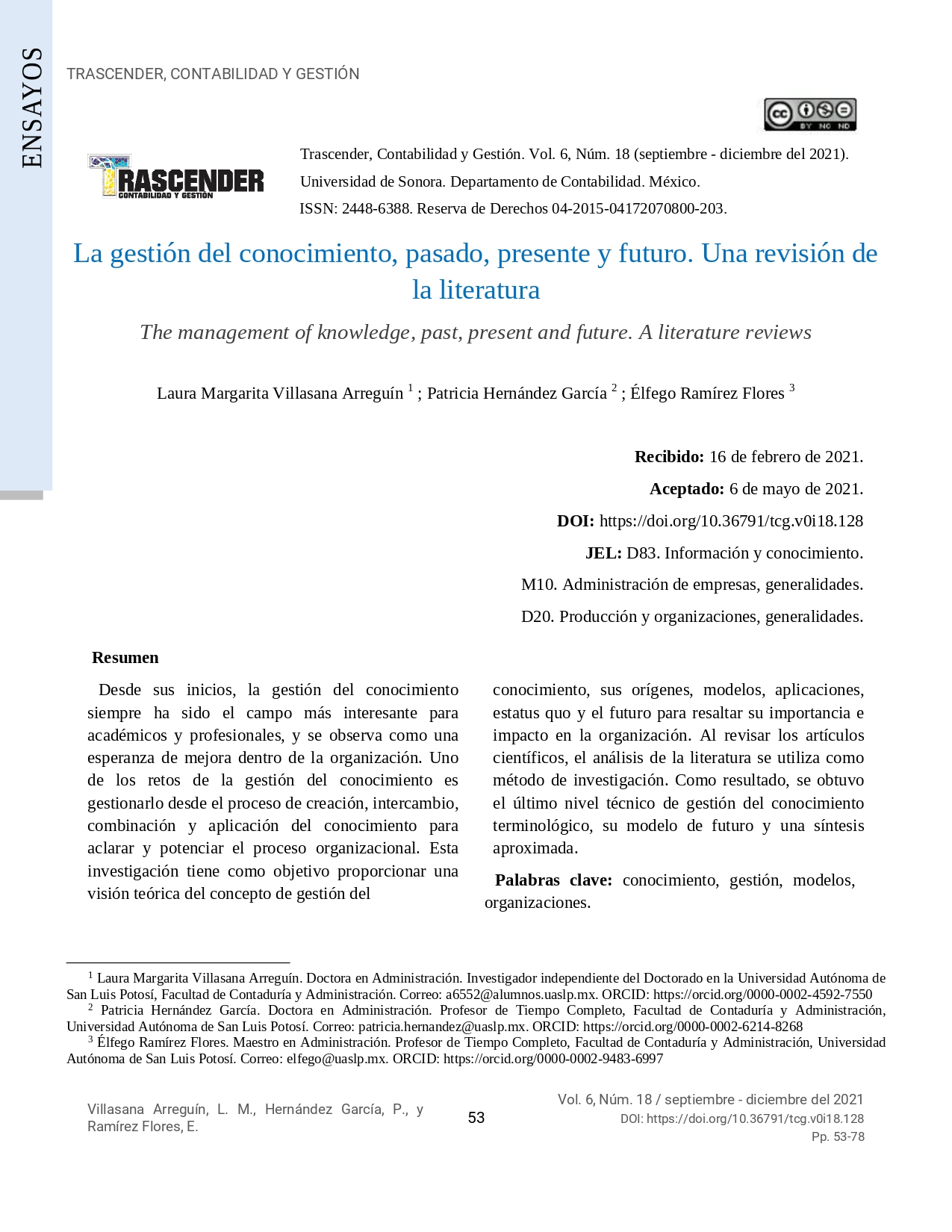
Downloads
Published
How to Cite
Issue
Section
License
Copyright (c) 2021 Laura Margarita Villasana Arreguín, Patricia Hernández García, Élfego Ramírez Flores

This work is licensed under a Creative Commons Attribution-NonCommercial-NoDerivatives 4.0 International License.
La Revista Trascender, Contabilidad y Gestión se compromete a asegurar la confidencialidad y privacidad dela información personal que se capture en éste sistema de conformidad con los lienamientos editoriales de la Universidad de Sonora
La información será utilizada únicamente para fines editoriales, académicos y de investigación, notificándose de forma directa al usuario registrado en el sistema, con el alcance que el usuario establezca al momento de su registro.


